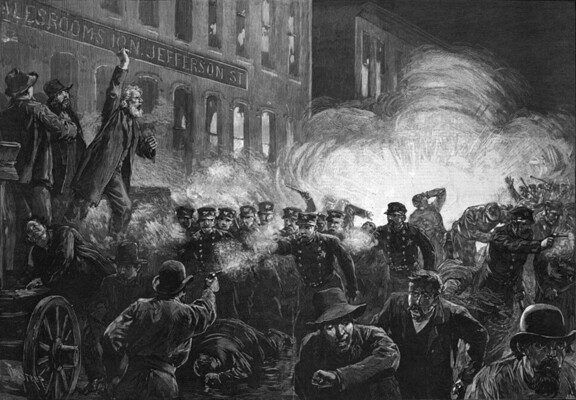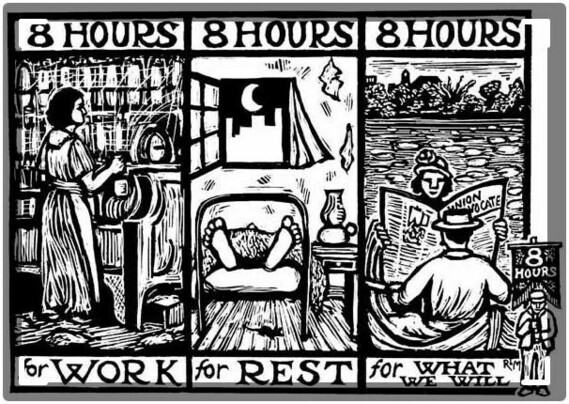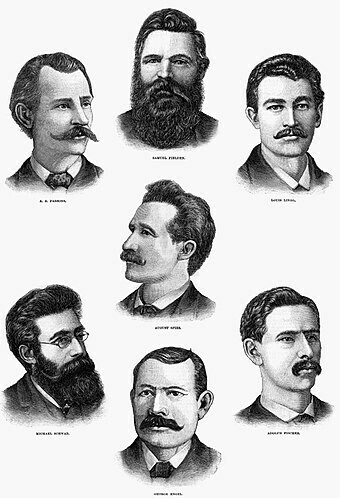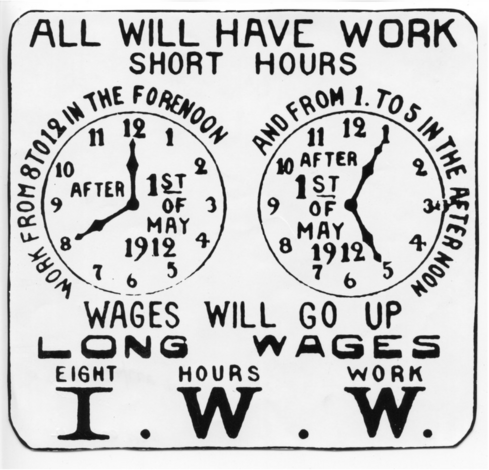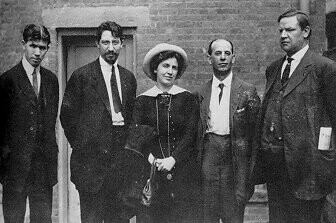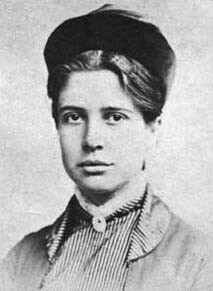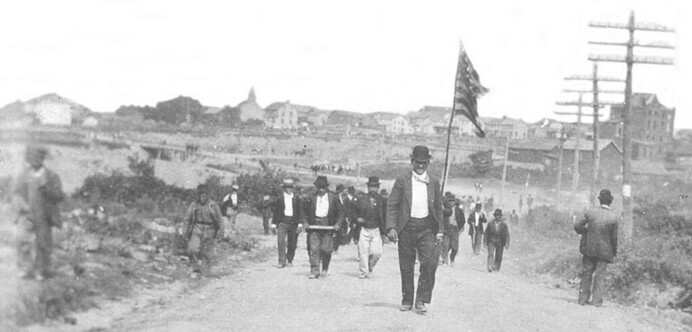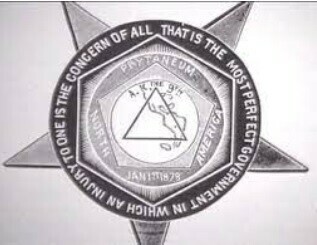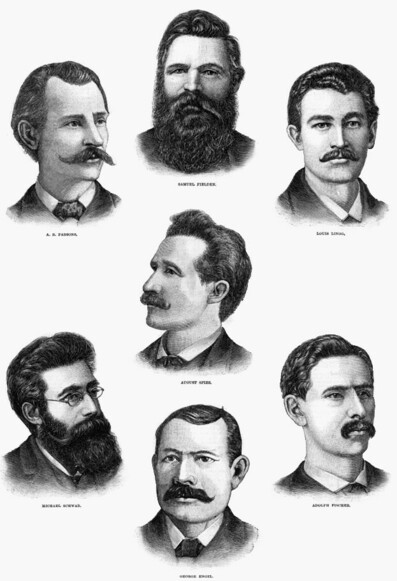MikeDunnAuthor · @MikeDunnAuthor
1171 followers · 2290 posts · Server kolektiva.socialToday In Labor History May 1, 1886: The first nationwide General Strike for the 8-hour day occurred in Milwaukee and other U.S. cities. In Chicago, police killed four demonstrators and wounded over 200. This led to the mass meeting a Haymarket Square, where an unknown assailant threw a bomb, killing several cops. The authorities responded by rounding up all the city’s leading anarchists, and a kangaroo court which wrongfully convicted 8 of them, including Albert Parsons, husband of Lucy Parsons, who would go on to cofound the IWW, along with Mother Jones, Big Bill Haywood, Eugene Debs, and others. Worldwide protests against the convictions and executions followed. To honor the wrongfully executed anarchists, and their struggle for the 8 hour day, May first has ever since been celebrated as International Workers Day in nearly every country in the world, except the U.S.
#WorkingClass #LaborHistory #anarchism #Haymarket #bombing #PoliceBrutality #police #prison #execution #DeathPenalty #GeneralStrike #IWW #LucyParsons #MotherJones #8HourDay
#workingclass #LaborHistory #anarchism #haymarket #bombing #policebrutality #police #prison #execution #deathpenalty #generalstrike #IWW #lucyparsons #motherjones #8hourday
MikeDunnAuthor · @MikeDunnAuthor
1171 followers · 2289 posts · Server kolektiva.socialToday In Labor History May 1, 1884: The Federation of Organized Trades and Labor Unions, forerunner of the AFL, resolved that "8 hours shall constitute a legal day's work starting May 1, 1886." Ironically, this union, created as a conservative foil against the radical Knights of Labor, helped radicalize workers with its resolution.
#WorkingClass #LaborHistory #8HourDay #union #KnightsOfLabor
#workingclass #LaborHistory #8hourday #union #knightsoflabor
MikeDunnAuthor · @MikeDunnAuthor
1145 followers · 2268 posts · Server kolektiva.socialToday in labor history April 30 1886: 50,000 workers in Chicago were on strike. 30,000 more joined in the next day. The strike halted most of Chicago’s manufacturing. On May 3rd, the Chicago cops killed four unionists. Activists organized a mass public meeting and demonstration in Haymarket Square on May 4. During the meeting, somebody threw a bomb at the cops. The explosion and subsequent gunfire killed seven cops and four civilians. Nobody ever identified the bomber. None of the killer cops was charged. However, the authorities started arresting anarchists throughout Chicago.
Ultimately, they tried and convicted eight anarchist leaders in a kangaroo court. The men were: August Spies, Albert Parsons, Adolph Fisher, George Engel, Louis Lingg, Michael Schwab, Samuel Felden and Oscar Neebe. Only two of the men were even present when the bomb was thrown. The court convicted seven of murder and sentenced them to death. Neebe was give fifteen years. Parson’s brother testified at the trial that the real bomb thrower was a Pinkerton agent provocateur. This was entirely consistent with the Pinkertons modus operandi. They used the agent provocateur, James McParland, to entrap and convict the Molly Maguires. As a result, twenty of them were hanged and the Pennsylvania mining union was crushed. McParland also tried to entrap WFM leader, Big Bill Haywood, for the murder of Idaho Governor Frank Steunenberg. Steunenberg had crushed the WFM strike in 1899, the same one in which the WFM had blown up a colliery. However, Haywood had Clarence Darrow representing him. And Darrow proved his innocence.
On November 11, 1887, they executed Spies, Parson, Fisher and Engel. They sang the Marseillaise, the revolutionary anthem, as they marched to the gallows. The authorities arrested family members who attempted to see them one last time. This included Parson’s wife, Lucy, who was also a significant anarchist organizer and orator. In 1905, she helped cofound the IWW. Moments before he died, Spies shouted, "The time will come when our silence will be more powerful than the voices you strangle today." And Engel and Fischer called out, "Hurrah for anarchism!" Parsons tried to speak, but was cut off by the trap door opening beneath him.
Workers throughout the world protested the trial, conviction and executions. Prominent people spoke out against it, includin Clarence Darrow, Oscar Wilde, George Bernard Shaw, and William Morris. The Haymarket Affair inspired thousands to join the anarchist movement, including Emma Goldman. And it is the inspiration for International Workers’ Day, which is celebrated on May 1st in nearly every country in the world except the U.S.
#WorkingClass #LaborHistory #anarchism #haymarket #LucyParsons #IWW #EmmaGoldman #strike #union #8HourDay #PoliceBrutality #KillerCops #prison #DeathPenalty #Pinkertons
#workingclass #LaborHistory #anarchism #haymarket #lucyparsons #IWW #EmmaGoldman #strike #union #8hourday #policebrutality #killercops #prison #deathpenalty #Pinkertons
MikeDunnAuthor · @MikeDunnAuthor
1080 followers · 2143 posts · Server kolektiva.socialToday in Labor History April 18, 1914: IWW workers in Taft, California, continued their strike against Standard Oil. It was the first strike ever against the company. The workers demanded an eight-hour day and a 50-cents raise.
#WorkingClass #LaborHistory #IWW #StandardOil #california #8HourDay
#workingclass #LaborHistory #IWW #standardoil #california #8hourday
MikeDunnAuthor · @MikeDunnAuthor
927 followers · 1688 posts · Server kolektiva.socialToday in Labor History March 15, 1917: The U.S. Supreme Court approved the 8-hour workday under the threat of a rail strike. Philadelphia carpenters struck for the 10-hour day in 1791 and by the 1830s, it had become a general demand of workers. In 1835, Philadelphia workers organized the first general strike in North America, led by Irish coal heavers, in the struggle for a 10-hour day. However, by 1836, labor movement publications were calling for an 8-hour day. In 1864, the 8-hour day became a central demand of the Chicago labor movement. In 1867, a citywide strike for the 8-hour day shut down the city's economy for a week before falling apart. During the 1870s, eight hours became a central demand of the U.S. labor movement, with a network of 8-Hour Leagues forming across the nation.
In 1872, 100,000 workers in New York City struck and won the eight-hour day. On May 1, 1886 Albert Parsons, head of the Chicago Knights of Labor, led 80,000 people down Michigan Avenue in the first modern May Day Parade, with workers chanting, "Eight-hour day with no cut in pay." Within days, 350,000 workers went on strike nationwide for the 8-hour day. On 3 May 1886, anarchist August Spies, editor of the Arbeiter-Zeitung (Workers Newspaper), spoke to 6,000 workers. Afterwards, they marched to the McCormick plant in Chicago to harass scab workers. The police arrived and opened fire, killing four and wounding many more. On May 4, workers protested this police violence at a meeting in Haymarket Square. An unknown assailant hurled a bomb at the police. The authorities rounded up hundreds of labor activists and anarchists. They convicted 8 in a kangaroo court and executed four of them, including Parsons and Spies.
In 1916, Congress passed the Adamson Act, establishing the 8-hour day for railroad workers. As with prior 8-hour laws, the bosses routinely violated the law until forced by the Supreme Court, 1917, to honor the rule. According to the Bureau of Labor Statistics, the average American works 8.8 hours every day.
#WorkingClass #LaborHistory #anarchism #8HourDay #SCOTUS #GeneralStrike #haymarket #PoliceBrutality #PoliceMurder #MayDay #DeathPenalty
#workingclass #LaborHistory #anarchism #8hourday #SCOTUS #generalstrike #haymarket #policebrutality #policemurder #mayday #deathpenalty
VacuousNess · @VacuousNess
143 followers · 375 posts · Server mas.toHappy #8HourDay Public Holiday #Australia
Don’t forget to thank the #unions ❤️👍
To those who worked the day. You’ve more than earned your penalty rates today. Thank you 🙏🏻
@AustralianLabor @unionsaustralia ❤️
#PublicHoliday #auspol #unions #Australia #8hourday
MikeDunnAuthor · @MikeDunnAuthor
881 followers · 1572 posts · Server kolektiva.socialToday in Labor History March 7, 1942: IWW cofounder and anarchist labor organizer Lucy Parsons died on this date in Chicago, Illinois. Lucy Parsons was part African American and part Native American. Her mother had been a slave. In 1871, she married Albert Parsons, a Confederate soldier, in Waco, Texas. Soon after, they were forced to flee due to racism, moving to Chicago. There they participated in the Great Upheaval of worker rebellions that swept across the U.S. in 1877. They were also active in the movement for the 8-hour day and other worker movements. In 1887, the authorities executed Albert, along with several other anarchists, for the Haymarket bombing, even most hadn’t been present at the bombing. In 1905, Lucy Parsons cofounded the IWW, along with Eugene Debs, Mother Jones, Big Bill Haywood and others. In 1915, she organized the Chicago Hunger Demonstrations. They were so effective that they pushed the AFL, the Socialist Labor Party and the Hull House to participate. In 1925, she participated in the International Labor Defense, which defended workers, communists, the Scottsboro Nine and others.
#LaborHistory #WorkingClass #LucyParsons #IWW #haymarket #anarchism #communism #racism #rebellion #8HourDay #MotherJones #EugeneDebs #execution #BigBillHaywood
#LaborHistory #workingclass #lucyparsons #IWW #haymarket #anarchism #communism #racism #rebellion #8hourday #motherjones #eugenedebs #execution #bigbillhaywood
MikeDunnAuthor · @MikeDunnAuthor
835 followers · 1456 posts · Server kolektiva.socialToday in Labor History February 25, 1913: The IWW-led silk strike began in Paterson, New Jersey. 25,000 immigrant textile workers walked out when mill owners doubled the size of the looms without increasing staffing or wages. Workers also wanted an 8-hour workday and safer working conditions. Within the first two weeks of the strike, they had brought out workers from all the local mills in a General Strike of weavers and millworkers. Over the course of the strike, 1,850 workers were arrested, including Big Bill Haywood and Elizabeth Gurley Flynn. Five workers were killed during the 208-day strike. The strike ended in failure on July 28.
#WorkingClass #LaborHistory #PattersonSilkStrike #IWW #ElizabethGurleyFlynn #BigBillHaywood #massacre #strike #GeneralStrike #8HourDay
#workingclass #LaborHistory #pattersonsilkstrike #IWW #elizabethgurleyflynn #bigbillhaywood #massacre #strike #generalstrike #8hourday
MikeDunnAuthor · @MikeDunnAuthor
762 followers · 1317 posts · Server kolektiva.socialToday in Labor History February 17, 1932: Florence Kelley (b.1859) died on this date. Kelley was a social and political reformer who worked against sweatshops and fought for the minimum wage, eight-hour workday and children’s rights. She coined the term “wage abolition.” She also helped create the NAACP. Kelley was a follower of Karl Marx and a personal friend of Friedrich Engels. As a youth, she belonged to the Intercollegiate Socialist Society and was an activist for women's suffrage and African-American civil rights.
#WorkingClass #LaborHistory #KarlMarx #socialism #CivilRights #union #sweatshops #MinimumWage #naacp #8HourDay
#workingclass #LaborHistory #KarlMarx #socialism #civilrights #union #sweatshops #minimumwage #naacp #8hourday
MikeDunnAuthor · @MikeDunnAuthor
663 followers · 1124 posts · Server kolektiva.socialToday in Labor History February 1, 1913: The IWW Patterson silk workers’ strike began. They were fighting for an 8-hr work day and better working conditions. Over the course of the strike, 1,850 workers were arrested, including Big Bill Haywood and Elizabeth Gurley Flynn. Within the first two weeks of the strike, they had brought out workers from all the local mills in a General Strike of weavers and millworkers. Two workers died in the struggle, one shot by a vigilante and the other by a private guard. The strike ended in failure on July 28.
#workingclass #LaborHistory #patterson #strike #IWW #ElizabethGurleyFlynn #8hourday #generalstrike #police #prison #BigBillHaywood #vigilantes
#workingclass #LaborHistory #patterson #strike #IWW #elizabethgurleyflynn #8hourday #generalstrike #police #prison #bigbillhaywood #vigilantes
MikeDunnAuthor · @MikeDunnAuthor
631 followers · 1012 posts · Server kolektiva.socialToday in Labor History January 22, 1890: The Knights of Labor Trade Assembly No. 135 and the National Progressive Miners Union merged to form the United Mine Workers of America. Their initial goals were improved mine safety, impendence from company stores, and collective bargaining. In 1898, they won the 8-hour day. By the 1930s, the UMW had over 800,000 members. However, their history was filled with bloody strikes. On April 3, 1891, deputized members of the National Guard killed at least 10 striking UMW members in the Morewood massacre. The cops killed 19 striking UMW members in the Lattimer Massacre, September 10, 1897. Eight UMW members and five private detectives died in the Battle of Virden, in October 1898.
#workingclass #LaborHistory #KnightsOfLabor #UnitedMineWorkers #umw #strike #massacre #mining #8hourday
#workingclass #LaborHistory #knightsoflabor #unitedmineworkers #umw #strike #massacre #mining #8hourday
MikeDunnAuthor · @MikeDunnAuthor
266 followers · 321 posts · Server kolektiva.socialToday in Labor History December 9, 1869: The Knights of Labor was founded on this date in Philadelphia as a secret society open to all members of the producing classes except "parasites" like stockbrokers, gamblers and lawyers. The Knights were one of the most important labor organizations of the late 1800s, reaching a membership of 700,000 by 1886. While other unions were fighting for a 10-hour work day, the Knights were demanding an 8-hour day, as well as an end to child and convict labor. They were also one of the earliest labor organizations to accept blacks and women, and one of the first organized by industry, rather than craft. Yet they also supported the Chinese Exclusion Act and participated in anti-Chinese riots.
#knightsoflabor #industrialunionism #union #racism #AntiAsianHate #feminism #8hourday #strike #labor #workingclass #immigrant
#knightsoflabor #IndustrialUnionism #union #racism #AntiAsianHate #feminism #8hourday #strike #labor #workingclass #immigrant
MikeDunnAuthor · @MikeDunnAuthor
222 followers · 238 posts · Server kolektiva.socialToday in Labor History December 6, 1889: The trial of the Chicago Haymarket anarchists began amidst national and international outrage and protest. None of the men on trial had even been at Haymarket Square when the bomb was set off. They were on trial because of their anarchist political affiliations and their labor organizing for the 8-hour day. 4 were ultimately executed. One, Louis Ling, cheated the hangman by committing suicide in his cell.
#anarchism #anarchist #haymarket #police #bombing #workingclass #labor #kangaroocourt #8hourday
#anarchism #Anarchist #haymarket #police #bombing #workingclass #labor #kangaroocourt #8hourday
